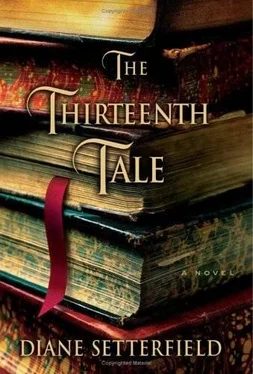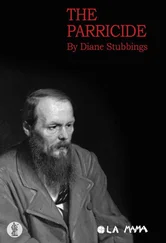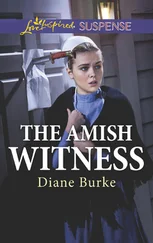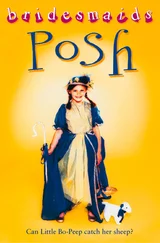The path around the fields took her up a slight incline that, though not much of a hill, gave her a fine view of the fields and land around. She was about halfway to the doctor's, striding out vigorously, heartbeat raised but without the slightest sense of overexertion, feeling quite probably that she could fly if she just put her mind to it, when she saw something that stopped her dead.
In the distance, playing together in a field, were Emmeline and Adeline. Unmistakable. Two manes of red hair, two pairs of black shoes; one child in the navy poplin that the Missus had put Emmeline in that morning, the other in green.
It was impossible.
But no. Hester was scientific. She was seeing them, hence they were there. There must be an explanation. Adeline had escaped from the doctor's house. Her torpor had left her as suddenly as it had come and, taking advantage of an open window or a set of keys left unattended, she had escaped before anyone had noticed her recovery. That was it.
What to do? Running to the twins was pointless. She'd have had to approach them across a long stretch of open field, and they would see her and flee before she had covered half the distance. So she went to the doctor's house. At a run.
In no time she was there, hammering impatiently at the door. It was Mrs. Maudsley who opened it, tight-lipped at the racket, but Hester had more important things on her mind than apologies and pushed past her to the door of the surgery. She entered without knocking.
The doctor looked up, startled to see his collaborator's face flushed with exertion, her hair, normally so neat, flying free from its grips. She was out of breath. She wanted to speak but for the moment could not.
"Whatever is it?" he asked, rising from his seat and coming around the desk to put his hands on her shoulders. "Adeline!" she gasped. "You've let her out!"
The doctor, puzzled, frowned. He turned Hester by the shoulders, until she was facing the other end of the room.
There was Adeline.
Hester spun back around to the doctor. "But I've just seen her! With Emmeline! On the edge of the woods beyond Oates's field… " She began vehemently enough, but her voice tailed off as she began to wonder. "Calm yourself, sit down, here, take a sip of water," the doctor was saying. "She must have run off. How could she have got out? And come back so quickly?" Hester tried to make sense of it.
"She has been here in this room this last two hours. Since breakfast. She has not been unsupervised in all that time." He looked into Hester's eyes, stirred by her emotion. "It must have been another child. From the village," he suggested, maintaining his doctorly decorum.
"But-" Hester shook her head. "It was Adeline's clothes. Adeline's hair."
Hester turned to look at Adeline again. Her open eyes were indifferent to the world. She was wearing not the green dress Hester had seen a few minutes before but a neat navy one, and her hair was not loose but braided.
The eyes Hester turned back to the doctor were full of bewilderment. Her breathing would not steady. There was no rational explanation for what she had seen. It was unscientific. And Hester knew the world was totally and profoundly scientific. There could be only one explanation. "I must be mad," she whispered. Her pupils dilated and her nostrils quivered. "I have seen a ghost!"
Her eyes filled with tears.
It produced a strange sensation in the doctor to see his collaborator reduced to such a state of disheveled emotion. And although it was the scientist in him that had first admired Hester for her cool head and reliable brain, it was the man, animal and instinctive, that responded to her disintegration by putting his arms around her and placing his lips firmly upon hers in a passionate embrace.
Hester did not resist.
Listening at doors is not bad manners when it is done in the name of science, and the doctor's wife was a keen scientist when it came to studying her own husband. The kiss that so startled the doctor and Hester came as no surprise at all to Mrs. Maudsley, who had been expecting something rather like it for some time.
She flung the door open and in a rush of outraged righteousness burst into the surgery. "I will thank you to leave this house instantly," she said to Hester. "You can send John in the brougham for the child." Then, to her husband, "I will speak to you later."
The experiment was over. So were many other things. John fetched Adeline. He saw neither the doctor nor his wife at the house but learned from the maid about the events of the morning. At home he put Adeline in her old bed, in the old room, and left the door ajar.
Emmeline, wandering in the woods, raised her head, sniffed the air and turned directly toward home. She came in the kitchen door, made straight for the stairs, went up two steps at a time and strode unhesitatingly to the old room. She closed the door behind her.
And Hester? No one saw her return to the house, and no one heard her leave. But when the Missus knocked on her door the next morning, she found the neat little room empty and Hester gone.
I emerged from the spell of the story and into Miss Winter's glazed and mirrored library.
"Where did she go?" I wondered.
Miss Winter eyed me with a slight frown. "I've no idea. What does it matter?" "She must have gone somewhere." The storyteller gave me a sideways look. "Miss Lea, it doesn't do to get attached to these secondary characters. It's not their story. They come, they go, and when they go they're gone for good. That's all there is to it."
I slid my pencil into the spiral binding of my notebook and walked to the door, but when I got there, I turned back. "Where did she come from, then?" "For goodness' sake! She was only a governess! She is irrelevant, I tell you." "She must have had references. A previous job. Or else a letter of application with a home address. Perhaps she came from an agency?"
Miss Winter closed her eyes and a long-suffering expression appeared on her face. "Mr. Lomax, the Angelfield family solicitor, will have all the details I'm sure. Not that they'll do you any good. It's my story. I should know. His office is in Market Street, Banbury. I will instruct him to answer any inquiries you choose to make."
I wrote to Mr. Lomax that night.
The next morning, when Judith came with my breakfast tray, I gave her the letter for Mr. Lomax, and she took a letter for me from her apron pocket. I recognized my father's handwriting.
My father's letters were always a comfort, and this one was no exception. He hoped I was well. Was my work progressing? He had read a very strange and delightful nineteenth-century Danish novel that he would tell me about when I returned. At auction he had come across a bundle of eighteenth-century letters no one seemed to want. Might I be interested? He had bought them in case. Private detectives? Well, perhaps, but would a genealogical researcher not do the job just as well or perhaps better? There was a fellow he knew who had all the right skills, and come to think of it, he owed Father a favor-he sometimes came into the shop to use the almanacs. In case I intended to pursue the matter, here was his address. Finally, as always, those well meant but desiccated four words: Mother sendsherlove.
Did she really say it? I wondered. Father mentioning, I'll write to Margaret this afternoon, and she-casually? warmly?- Send her my love.
No. I couldn't imagine it. It would be my father's addition. Written without her knowledge. Why did he bother? To please me? To make it true? Was it for me or for her that he made these thankless efforts to connect us? It was an impossible task. My mother and I were like two continents moving slowly but inexorably apart; my father, the bridge builder, constantly extending the fragile edifice he had constructed to connect us. A letter had come for me at the shop; my father enclosed it with his own. It was from the law professor Father had recommended to me.
Читать дальше












